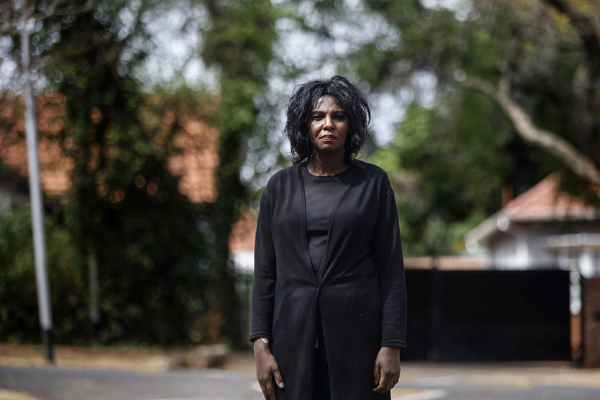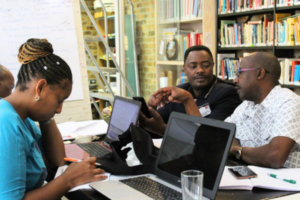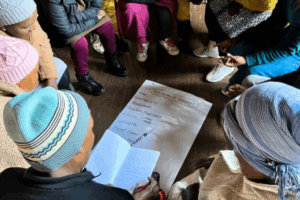We are responsible for cleaning houses, doing laundry, and tidying up after both children and adults. Despite numbering around one million, we often go unnoticed, even though we play a significant role in South Africa’s workforce. I am Pinky Mashiane, a 48-year-old domestic worker and founder of the United Domestic Workers of South Africa (UDWOSA). Through UDWOSA, I am committed to proving that care work is essential to the country’s economy.
I have worked as a domestic worker for 18 years while raising my now 20-year-old daughter. Most domestic workers in South Africa are black women. Our struggles are well-documented: low pay, long hours, GBV and harassment, and a legal system that fails to recognise the hazards of our work.
In 2000, when I started, I was unaware of my rights. However, after joining the South African Domestic Service and Allied Workers Union (SADSAWU), I learned about labour laws such as the Labour Relations Act and the Basic Conditions of Employment Act. These laws establish workers’ rights, including minimum wages, working hours, leave, and termination. As an organiser at SADSAWU, I focused on educating domestic workers about their rights and advocating for labour laws that cater to our sector.
UDWOSA is growing, with over 200 members in Tshwane and Ekurhuleni. We plan to expand to the Western Cape and Mpumalanga in 2019. Organising domestic workers is challenging because we work in private homes, isolated from each other. We need to be creative in recruiting and organising. For example, we use trains in Gauteng to speak about working conditions, national minimum wage, UIF, and workplace violence.
My turning point
One day in 2001, I was on my way to visit my sister when I witnessed an employer assaulting his gardener, an elderly man. The employer slapped the worker so hard that I felt as if I had been slapped myself. The gardener could have been my father or uncle. Strangely, my feet refused to move towards my original destination, and instead, I found myself at the man’s gate, confronting him. I pretended to be a labour inspector who had witnessed the abuse. I asked the employer to name the law that permitted him to assault his employee. He invited me into his home, clearly afraid I would report the incident. I then confessed that I wasn’t from the Department of Labour. Despite this, he apologised to the worker. At that moment, I thought to myself, ‘If I can get this man to apologise to his gardener in my presence, then surely I can do more!’ Since then, I haven’t looked back. My quest is to ensure every domestic worker has just and favourable conditions at work.
The ongoing struggle
Despite our efforts, domestic workers still face poor treatment. Our work is vital for the economy, yet many do not see it as decent work, even though the ILO convention says otherwise. That we are not covered by the Compensation for Occupational Injuries and Diseases Act (COIDA) is offending. This law excludes domestic workers from the definition of “employee,” meaning we can’t claim compensation for workplace injuries because our employers are not required to contribute to the compensation fund. The main excuse for our exclusion is that some of us work for multiple employers, making implementation complex. But this is a non-issue; COIDA can be administered similarly to the Unemployment Insurance Act, which includes domestic workers.
Nearly 80% of us are the sole providers for our families. What happens when caregivers, drivers, and gardeners are injured or die due to their work? A study by the Solidarity Center highlights workplace injuries among domestic workers in South Africa. I know many workers who have suffered injuries or even death at work. David Ngobeni fell while cleaning windows in 2011, and his employer abandoned him. David is now disabled and was not compensated. Joan was bitten by a dog at work and later died. And I’ll never forget Maria Mahlangu, who drowned in 2012 while cleaning windows near an uncovered pool. Her employer offered her grieving family a mere R2,500.
Challenging COIDA
Maria’s daughter is challenging the constitutionality of COIDA, with widespread support from domestic workers’ unions and the Solidarity Center. Since 2011, Labour Minister Mildred Oliphant has not acted on her promise to amend COIDA to include domestic workers. We support Maria’s daughter’s argument that the department’s inaction is unconstitutional. Our only recourse is to sue our employers, which is unreasonable given the time and cost involved.
Public submissions for the COIDA Amendment Bill 2018 closed on December 18. I am hopeful that the minister will sign the bill, given the pressure from the court case and our advocacy work. We believe the Minister must compensate Maria’s family and others who can prove they were injured or died at work since 1994. Our campaign for COIDA will continue until justice is served.
A call for change
The voices of domestic workers must be heard. The #HearMeToo theme of the 16 Days of Activism for No Violence Against Women and Children campaign resonates with us. Gender-based violence affects many of us both at work and at home. This abuse must end. I urge my colleagues to speak out and support each other. Our union has partnered with experts to help survivors of gender-based violence.
We have achieved some victories, but there is still a long way to go. Together, we can secure decent work for all.
*Update: In 2019, the Pretoria High Court ruled that the exclusion of domestic workers from COIDA is unconstitutional.







